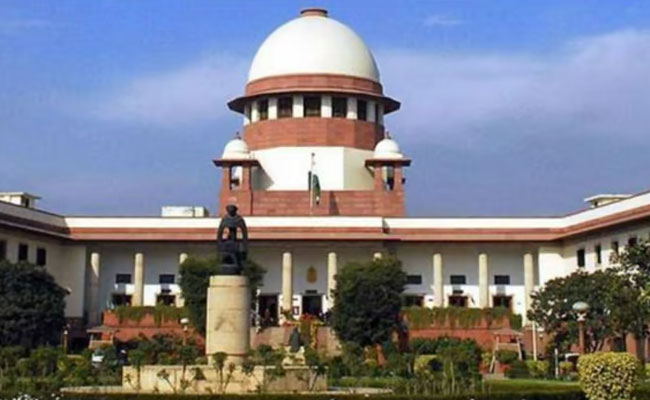New Delhi: In a landmark 4:3 decision, a seven-judge bench of the Supreme Court today overruled the 1967 S. Azeez Basha vs. Union of India verdict, which had previously held that an institution created by statute could not claim minority status. The case involves Aligarh Muslim University (AMU) and its long-debated status as a minority institution. The court determined that a statutory basis does not automatically disqualify an institution from minority status and has directed a regular bench to decide the issue based on who was instrumental in establishing AMU.
The majority opinion, led by Chief Justice of India DY Chandrachud, who delivered the judgment on his last working day, was supported by Justices Sanjiv Khanna, JB Pardiwala, and Manoj Misra. Dissenting opinions were voiced by Justices Surya Kant, Dipankar Datta, and SC Sharma. The majority concluded that determining an institution’s minority status should focus on who ideated, funded, and founded it, rather than solely its statutory establishment. The 1967 Azeez Basha decision, which barred AMU from claiming minority status due to its incorporation by statute, was thus overturned.
The Constitution Bench was tasked with examining whether AMU, established by the AMU Act of 1920, qualifies as a minority institution under Article 30 of the Constitution, which grants minorities the right to establish and administer educational institutions. The majority stressed that formal statutory language should not override historical and substantive evidence indicating a minority foundation. The bench also questioned the Azeez Basha decision's interpretation of "incorporation" versus "establishment."
The case's origins trace back to a 2006 Allahabad High Court ruling that deemed AMU a non-minority institution, impacting its ability to reserve seats for Muslim candidates. This decision relied on the Azeez Basha precedent, which the Supreme Court has now set aside, opening the way for fresh examination.
Representatives for AMU, including Senior Advocates Dr Rajeev Dhavan, Kapil Sibal, and Salman Khurshid, contended that historical records support AMU's minority roots. Meanwhile, Attorney General R. Venkataramani and Solicitor General Tushar Mehta, representing the Union of India, argued against granting AMU minority status.
The Supreme Court has instructed that further factual findings regarding AMU’s foundation be handled by a regular bench, applying the majority’s new framework for assessing minority status.
Let the Truth be known. If you read VB and like VB, please be a VB Supporter and Help us deliver the Truth to one and all.
ISLAMABAD: At least two more cases of poliovirus were reported in Pakistan, taking the number of infections to 52 so far this year, a report said on Friday.
“The Regional Reference Laboratory for Polio Eradication at the National Institute of Health has confirmed the detection of two more wild poliovirus type 1 (WPV1) cases in Pakistan," an official statement said.
The fresh infections — a boy and a girl — were reported from the Dera Ismail Khan district of Khyber-Pakhtunkhwa province.
“Genetic sequencing of the samples collected from the children is underway," the statement read. Dera Ismail Khan, one of the seven polio-endemic districts of southern Khyber Pakhtunkhwa province, has reported five polio cases so far this year.
Of the 52 cases in the country this year, 24 are from Balochistan, 13 from Sindh, 13 from Khyber Pakhtunkhwa, and one each from Punjab and Islamabad.
There is no cure for polio. Only multiple doses of the oral polio vaccine and completion of the routine vaccination schedule for all children under the age of five can keep them protected.





